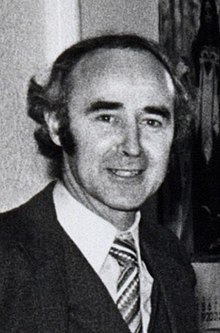Early life and family
Templeton was born in Wyndham,Southland,in 1929. He was educated at Gore High School,King's High School,the University of Otago, and then as a Rhodes Scholar at Balliol College,Oxford University in 1952–53. He married Russian-born New Zealand novelist Natasha Templeton in Wellington in 1961. [2] [3]
His brother,Malcolm,was a Foreign Service officer who represented New Zealand at the United Nations. His twin brother Ian is a veteran press gallery journalist and author.
From 1954 to 1969 Templeton served with the New Zealand Department of External Affairs,first in London,and then in Wellington,before going as the last Deputy High Commissioner of Western Samoa to prepare specially for independence and then to New York to assist secure Samoa's post independence aid programmes,under Guy Powles. From 1965 to 1969 Templeton served in Wellington working on Asian and European and Defence affairs,before being elected to Parliament.
Member of Parliament
Templeton was elected as MP for Awarua in Southland in 1969. However, he lost the electorate in the 1972 election to Labour's Aubrey Begg. He was one of four National Party incumbents from Otago and Southland who lost their normally blue electorate to the Labour challenger over the proposed raising of the lake levels of lakes Manapouri and Te Anau, which was opposed by the Save Manapouri campaign. Labour's election manifesto was for the lakes to remain at their natural levels. [5]
From 1972 to 1975, after losing his parliamentary seat, he was executive assistant to the Leaders of the Opposition (first Jack Marshall and then Robert Muldoon). Despite no longer being a Member of Parliament Templeton continued as the secretary of the National caucus. [6] Templeton was re-elected to Parliament in 1975 for the Wellington electorate of Karori. The electorate was renamed Ohariu and was represented by Templeton until the 1984 election when he was defeated by Peter Dunne, then a member of the Labour Party, in a three-way contest with the New Zealand Party's leader Bob Jones. His friend and diplomatic colleague Chris Beeby commented on Templeton's election losses "It must take a very special kind of talent to fuck up two blue-ribbon seats." In contrast, former attorney-general Chris Finlayson said that Templeton was "...a fine MP and Minister, whose contribution to this country has never been properly recognised." [9]
This page is based on this
Wikipedia article Text is available under the
CC BY-SA 4.0 license; additional terms may apply.
Images, videos and audio are available under their respective licenses.
